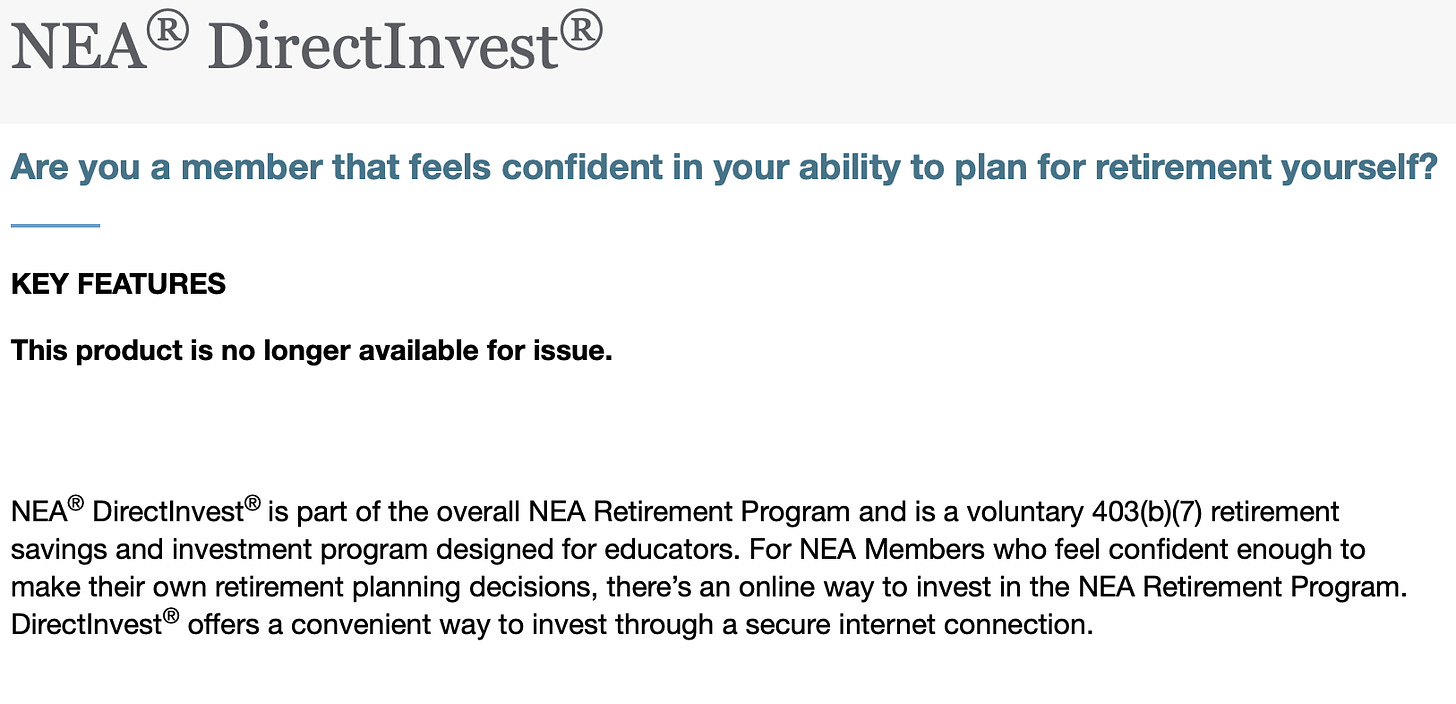NEA Discontinues Direct Invest 403(b), Replaced with Invest Myself
In doing so they raise fees on Vanguard mutual funds
NEA's Direct Invest 403(b)7 product was discontinued for new accounts this week; a new product named Invest Myself will be its successor.
Invest Myself is available to enroll immediately, though it needs to be clarified if one needs to be a member of the NEA to do so. As of December 29th, an educator must create an account with NEA Member Benefits (which anyone can do), but it doesn't appear all accounts are eligible to enroll at this point. We are seeking clarification.
Invest Myself is both more expensive and cheaper than Direct Invest. We will break it down for you.
While the investments are changing (for the better), the new Invest Myself product adds a new asset-based fee of 0.30% (capped at $500 annually) that did not exist in Direct Invest. The $35 annual fee on account balances of less than $50,000 remains, as do the loan fees. There is a new fee if you don't elect electronic statements, $30.
Direct Invest was an outdated product with significant flaws but offered Vanguard index funds with no asset-based fee. There were no fees on Vanguard fund holders because Direct Invest used mutual funds with significantly higher fees which paid revenue to the record keeper, Security Benefit. A participant who didn't know any better might choose the BNY Mellon International Stock Index, which charges 0.60% annually, when they could have chosen the Vanguard Total International Stock Index for 0.11%. They are virtually the same, but BNY pays revenue to Security Benefit, and Vanguard doesn't. One participant is subsidizing the costs of another.
Invest Myself is an attempt to even out who is paying for the product's expenses. We believe that almost all new accounts opened with the Direct Invest product were investing their money with the non-revenue sharing Vanguard funds. This meant very little revenue went to Security Benefit, which likely didn't sit well.
Invest Myself does away with revenue sharing entirely and only offers Vanguard mutual funds, a significant improvement.
The mutual funds available are (unclear of the share class at this time):
Vanguard Target Date funds
Vanguard 500 Index
Vanguard Federal Money Market
Vanguard Growth Index
Vanguard Intermediate Bond Index
Vanguard Mid Cap Index
Vanguard Small Cap Index
Vanguard Total Stock Market Index
Vanguard Total International Stock Market Index
Vanguard Real Estate Index
We'd prefer they also offer Vanguard Emerging Markets, Vanguard Short-Term Inflation-Protection, and Vanguard LifeStrategy mutual funds, but they can always add later. Invest Myself has a great lineup of Vanguard funds and allows anyone to build a diversified portfolio at a relatively low price.
The enrollment process is all digital and relatively smooth. A quick enroll option and a guided enroll option provide a lot of good information to help someone new to 403(b) get started. The one issue I have with this new enrollment process is it appears you must agree to share your information with Security Benefit in a way that would allow their sales people to contact you to offer other, higher cost products. We are seeking clarification.
Invest Myself is not yet disclosed on California’s 403bCompare.com website and thus not yet available in California.
Invest Myself is not a bad product; it would be rated Green by the 403bwise.org system based on the fee structure (same for Direct Invest). Still, the affiliation with Security Benefit and NEA Member Benefits makes it Yellow. NEA Member Benefits partners with Red-rated vendor Security Benefit to sell high-cost financial products to unsuspecting members. This brings the rating down from Green to Yellow (meaning proceed with caution).
If your public school employer doesn't offer one of the vendors rated Green by 403bwise.org, the new Invest Myself 403(b) from NEA Member Benefits and Security Benefit might be your next best option.
While we are disappointed to lose the ability to buy Vanguard funds for only $35 per year with Direct Invest, the new Invest Wisely is better than 98% of the products offered in the non-ERISA 403(b) world.
The NEA has never been on the side of its members regarding defined contribution plans. This is disappointing, considering it's literally one of the reasons a union exists (to bargain for better benefits). If the NEA really wanted to make a positive impact, they'd stop offering 403(b) products all together and instead advocate better options and management of these plans. We'd rather see the NEA work to clean up the 403(b) industry rather than use a subsidiary to partner with the industry and rake in millions yearly.





